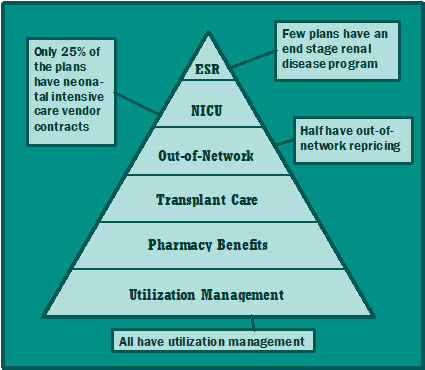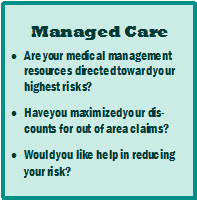This article is part of a series of case studies—real stories of how managed care companies increased profits by using Summit Re’s resources to increase sales, decrease expenses, and manage claims. This case study addresses one of the latest developments in managed care—post-payment administration and claim recovery. Imagine the impact on your bottom line if you recovered 2 to 3 percent of claims, after all current internal processes were completed.
This service is available through Summit Re’s arrangement with Health Decisions, Inc., one of the most comprehensive and sophisticated post-payment administrators in the country. Independent benchmarking analyses have confirmed that its approach sets new standards for the use of data produced by claim payment, enrollment, and related systems. Through its services, you have access to postpayment support equivalent to that available to the largest payers— without development costs or lead time.
Potential recovery areas
The focus for recoveries occurs in the following areas:
- Other liable parties not correctly reported by enrollees for benefit coordination
- Medicare-as-primary payer (ESRD, retirees, disabled) to offset any Medicare-as secondary-payer demands
- Enrollment discrepancies, such as ineligible and terminated members, family status changes, etc.
- Provider billing errors, such as inappropriate service codes, unbundling, duplicate payments, discount avoidance, fee inflation, double billing, etc.
- “Not a covered benefit” enforcement at the procedure code level
- Judicial judgments, such as divorces, workers compensation, and subrogation
Services available
Existing data are combined with new data and converted to Microsoft® compatible files. This new data set has many applications, including supporting internal client management, maximizing claim recovery returns and processing efficiency, and supporting new client service offerings.
Claim Recovery Service
Identifies claims that should have been paid by others and pursues collection from other payers, such as Medicare or insurers, and providers.
Enrollment Support Service
Handles all the details of special (non-routine) employee/enrollee communications to compile, compare and reconcile internal and external data files across multiple payers.
Recovery Software
Use of Health Decisions, Inc.’s proprietary software on internal network systems.
Data Support Services
A full range of technical support permits translation of any documented file structure into Microsoft® compatible files for HIPAA compliant data analysis, reporting and warehousing.
Flexible payment arrangements
Health Decisions, Inc. can be compensated on a contingency basis, keeping 33% of recovered claim amounts. Health Decisions, Inc. is also willing to enter into a multiyear, fixed-fee software lease covering its Paperless Claim Recovery software suite and all related support services.
Client results
Client “A” used post-payment findings to pursue claim recovery and returned $15 per member per year to its bottom line.
Client “B” used post-payment findings as a continuous-quality improvement management tool to monitor internal performance improvements.
Client “C” used post-payment findings to pinpoint “problem” providers and to support provider contracting negotiations.
Health Decisions, Inc.
Health Decisions, Inc. is an established, reputable and successful post-payment administration and claim recovery vendor. In one yearalone, they processed almost two billion dollars of paid claims. In the area of claim recovery, nobody addresses more recovery areas (40+ review areas), offers a lower recovery threshold (all claims over $10) or recovers a greater amount of money per client (2-3 percent of claims).




